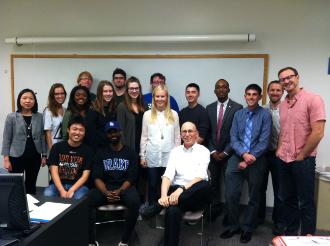What is Economics?
- "An inquiry into the nature and causes of the wealth of nations."
--Adam Smith (1776) - "A study of mankind in the ordinary business of life."
--Alfred Marshall (1890) - "The study of how society manages its scarce resources."
--Gregory Mankiw (2013)

What is special about Drake's Economics program?
- Small classes, good teachers: Most introductory classes have 30-40 students. Most advanced classes have 15-30 students. Several professors have won Zimpleman College of Business undergraduate teaching awards.
- Business option: If you want a career in business, you can choose Drake's BSBA degree. This degree includes introductory courses in all business subjects, so you can hit the ground running at your first job.
- Mathematics option: If you want to go to graduate school in Economics or a related field like finance or public policy, you can choose Drake's Quantitative Economics Major. This option includes the mathematics and statistics courses that graduate schools require.
- Research experience: All Economics majors learn methods of data analysis and write a capstone research paper.
- Open to all: All Drake students can take Economics courses. Students in any Drake college or school can add a major in Economics, a major in Quantitative Economics, or a minor in Economics. Recent graduates have combined Economics with Actuarial Science, Finance, International Relations, Mathematics, Political Science, and even Music!
What do economists do?
Most students who major in economics use their economic insight for careers in business, government, or law. And they earn substantially more than graduates of most other majors.
But some students go on to graduate school to become professional economists working in business, government, universities, or research institutes. What do these professional economists do?
ANTITRUST ECONOMISTS scrutinize industries for monopoly power. They often testify in court cases as to whether mergers and other business actions will make industries less competitive. They evaluate government policies intended to promote competition and propose changes.
DEVELOPMENT ECONOMISTS study developing countries. They try to determine why some poor countries are growing fast and others are barely growing at all. They evaluate programs intended to reduce poverty and improve incomes, health and well-being in poor countries.
EDUCATION ECONOMISTS study the impact of education on life outcomes like employment, earnings, and health. They measure the costs and effectiveness of programs like pre-kindergarten, summer school, and charter schools. They investigate the impact of teacher education, class size, and alternative teaching methods.
ENVIRONMENTAL ECONOMISTS study the interaction between economic activity and the environment. They evaluate the effectiveness of existing government programs intended to help the environment and design new ones.
HEALTH ECONOMISTS study the health care system. They investigate how incentives affect health care outcomes--who gets care, how much care they get, and the quality of that care. They evaluate the cost and effectiveness of alternative health care systems.
INTERNATIONAL ECONOMISTS study patterns of trade and investment between countries. They study how international trade affects jobs, incomes, and economic growth in the U.S. and other countries. They evaluate the effectiveness of international trade agreements and organizations like the WTO. They also evaluate alternative policies for setting exchange rates between countries' currencies.
LABOR ECONOMISTS study the employment conditions of workers: pay, benefits, hours, health and safety, risk of layoff, etc. They investigate government programs such as minimum wage laws, union laws, unemployment insurance, social security, food stamps, antidiscrimination laws, and job training, to determine how much they actually help workers. Some testify in court as to how much a particular worker would earn were it not for some mishap, such as an accident or a wrongful firing.
MACROECONOMISTS study economic growth, inflation, and recessions, seeking to understand their causes. Those working in business and government often produce forecasts of GDP, unemployment, inflation, and interest rates. Other macroeconomists study the effectiveness of government policies intended to promote economic growth or control business cycles.
PUBLIC ECONOMISTS study government programs and the tax systems that pay for them. They also measure the effectiveness of government programs--highways, education, defense, social security, etc.--and the quality of government decision-making. They measure the impact of taxes on people's incentives to work and invest, on economic growth, and on inequality.
For more about what economists do, see this video from the American Economic Association, and the "Anything but Dismal" youtube channel.


